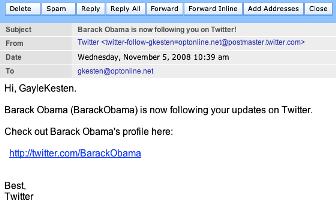Election '08: The Internet Wins
Two weeks ago I asked the question: Social networks as a business tool are gaining ground, but can they also predict the 44th president of the United States?

Two weeks ago I asked the question: Social networks as a business tool are gaining ground, but can they also predict the 44th president of the United States?YES! -- at least based on this presidential election. As I had blogged on Oct. 20, before the January primaries in Iowa, Facebook analytics forecasted Sen. (update: President-elect) Barack Obama's win over Sen. Hillary Clinton. And in mid-October, according to Facebook and TubeMogul.com, Obama had 2,168,036 Facebook friends, while McCain had 581,032 Facebook.
More cool stats from TubeMogul, from Monday' Washington Independent: "Obama's official YouTube channel is breaking records, topping 2 million viewers a day at its peak. That number does not include the millions of views for campaign-related videos posted by third parties. Sen. John McCains official YouTube channel, by contrast, remains steady at just under a quarter of a million views a day."
Silicon Alley Insider even went so far as to declare Obama President of YouTube.
No matter who you voted for, we can all agree that the Internet has emerged a real winner in this presidential election.
 According to Industry Standard technology writer Cyndy Aleo-Carreira: "The era of the Internet campaign has begun" -- "Right from the primaries, the Obama campaign showed how powerful harnessing the Internet and mobile devices could be. Supporters were encouraged to set up their own blogs, download chat and social network avatars, site widgets, and wallpapers, phone bank for the campaign from the privacy of their own homes, and, of course, donate. The campaign's reach across social networking was enormous in scope, with a presence on every conceivable social network, from Twitter to Facebook, and MySpace to LinkedIn. Even virtual world SecondLife had a concerted effort from the campaign, with news updates piped in from major news sites throughout the campaign. The campaign leveraged mobile as well, with SMS messages to subscribers, mobile apps, and phone calls."
According to Industry Standard technology writer Cyndy Aleo-Carreira: "The era of the Internet campaign has begun" -- "Right from the primaries, the Obama campaign showed how powerful harnessing the Internet and mobile devices could be. Supporters were encouraged to set up their own blogs, download chat and social network avatars, site widgets, and wallpapers, phone bank for the campaign from the privacy of their own homes, and, of course, donate. The campaign's reach across social networking was enormous in scope, with a presence on every conceivable social network, from Twitter to Facebook, and MySpace to LinkedIn. Even virtual world SecondLife had a concerted effort from the campaign, with news updates piped in from major news sites throughout the campaign. The campaign leveraged mobile as well, with SMS messages to subscribers, mobile apps, and phone calls."
Julie Germany, director of George Washington University's Institute for Politics Democracy & the Internet, told AFP the Internet was "like the central nervous system of [Obama's] campaign," which, the article also points out, early on had hired one of Facebook's founders.
And from David Krejci, SVP of interactive and social media at Weber Shandwick: "Social media are the continuation of our species' drive to connect, communicate and collaborate. Obama embraced this reality and, with it, propelled a network of mobilized, purposeful advocates the likes of which no marketing effort has ever seen...Obama made brilliant use of social media to connect with millions of supporters, and he gave them the tools and words and widgets to connect with millions more."
What do you think of the candidates' use of the Internet and social media as a tool in their campaigns? Do you think it made the difference?
About the Author(s)
You May Also Like
How to Amplify DevOps with DevSecOps
May 22, 2024Generative AI: Use Cases and Risks in 2024
May 29, 2024Smart Service Management
June 4, 2024







